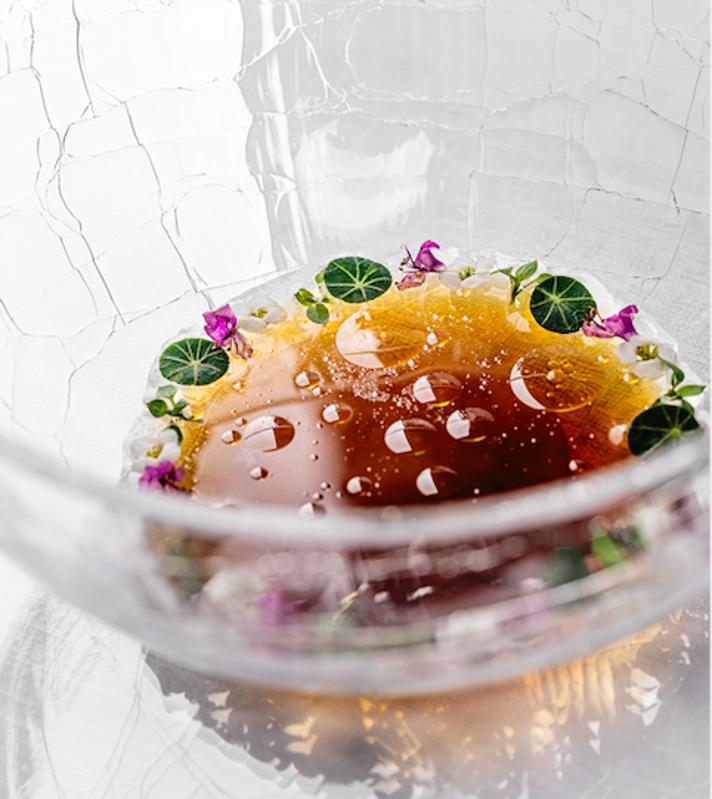Eric Vildgaard is known as one of Copenhagen’s most exciting chefs, the co-owner of two-star Michelin Jordnær, and the man behind some of the most exquisitely intricate, elegantly crafted dishes you will ever have placed in front of you. But it has not always been this way.

Gang activity in Copenhagen
Vildgaard grew up in northwest Copenhagen, in an area he describes as “a nice place with a lot of green areas”, but one that was also home to a lot of social outcasts. As kids, he and his friends used to “waste time” doing burglaries and car thefts but, before long, they started getting involved in organized crime.
“By the time I was 13, I was a handful, I was aggressive, and my parents kicked me out. They couldn’t deal with me,” he recalls.

Learning to cook
Throughout his teens, Vildgaard flitted between various juvenile detention centers, training schools and the Danish organized crime scene. It was at one of the training schools that Vildgaard discovered the passion that would, eventually, many years later, help him turn his life around. At the age of 16, he was sent on a sailing trip for troubled youths where he was put in charge of cooking meals for the crew.
“I had never imagined that I would enjoy cooking,” he says. “But I discovered it was a place where my mind was free.”
He returned to Copenhagen, intending to enrol in cooking school, but, instead, returned to his old neighborhood and fell in with the wrong crowd again.

Drugs, crime and cooking
The years that followed were a blur of drugs, alcohol and criminal gangs, coupled with stints in the kitchens of some of Denmark’s finest culinary establishments, including Søllerød Kro and Almanak. Meanwhile, the only stable influence in Vildgaard’s life was his brother, Torsten, who was a chef at Noma and René Redzepi’s right-hand man at the time.
“I’d always looked up to my brother. He was the better one of us, and I wanted his approval,” admits Vildgaard. “At the time, Noma had just been awarded its first Michelin star, so, when he asked me to help out, I did.”
Eric Vildgaard describes this period in his life as “schizophrenic”. On work days, he was giving his all in the kitchen, but, on his days off, he was in what he refers to as the “dark world”. After three years at Noma, Vildgaard returned to his old ways.

“Nobody is bad inside”
“I did some very bad things, things I’m not proud of,” he says. “I believe that, if you surround yourself with bad people, you become a bad person, but nobody is truly bad inside.”
Vildgaard finally hit rock bottom when both of his parents died within the space of just a few months. But this also ended up being a crucial turning point in his life.
“I was lying around doing nothing. A friend came and picked me up and we drove to a restaurant in the north of Copenhagen, where he was working. As soon as I put on my chef’s whites everything made sense again,” Vildgaard explains.
Vildgaard started helping out at the restaurant, Fredensborg Store Kro, and was eventually promoted to head chef. Around the same time he met his future wife, Tina, who was working front-of-house. Before long, she was pregnant.

Crossroads
“Meeting Tina was the greatest thing that ever happened to me,” he says. “When she found out she was pregnant, she told me, ‘Now you’re at a crossroads, you need to decide, you can’t be both Erics’.”
“She said that if I wanted to go in one direction it would have to be without her, but if I chose the other direction, it could be with her,” he adds.
Vildgaard made his choice and, in 2017, with a second baby on the way, the pair opened Jordnær. They received their first Michelin star within nine months and their second son arrived not long after. In 2020, the restaurant was awarded its second Michelin star.

Beautiful, brutal food
The name Jordnær, which translates as “down to earth”, is an accurate description of the unpretentious couple that run it, but there is nothing ordinary about the food.
Using only sustainable, seasonal produce, every one of Vildgaard’s creations is a feast for the eyes as well as the taste buds. Like his “langoustine essence”, a langoustine bouillon with tomato water and olive oil, that is not only magnificently well balanced, but also blows you away with its elegant simplicity. It is a dish that Vildgaard describes as capturing “the beauty of life.”
“When I created this dish, it was like I fully accepted my journey,” he says, concluding: “My food is a reflection of my soul. It’s aesthetically pleasing, complex and balanced but with potent flavors. It’s beautiful, brutal food.”







